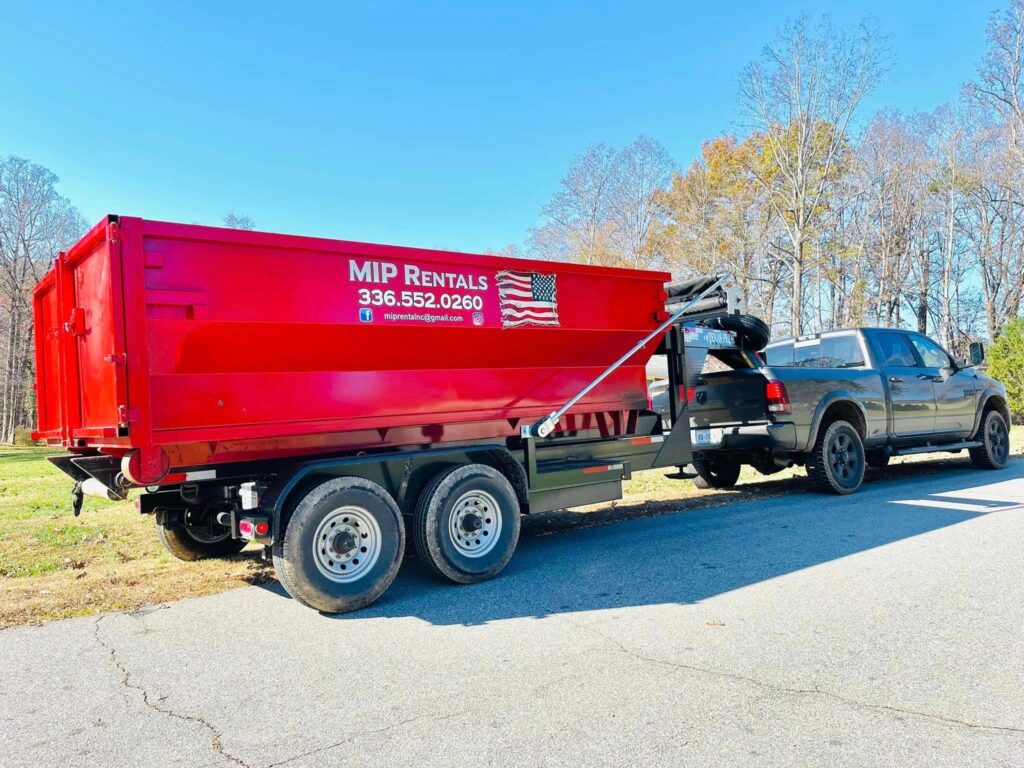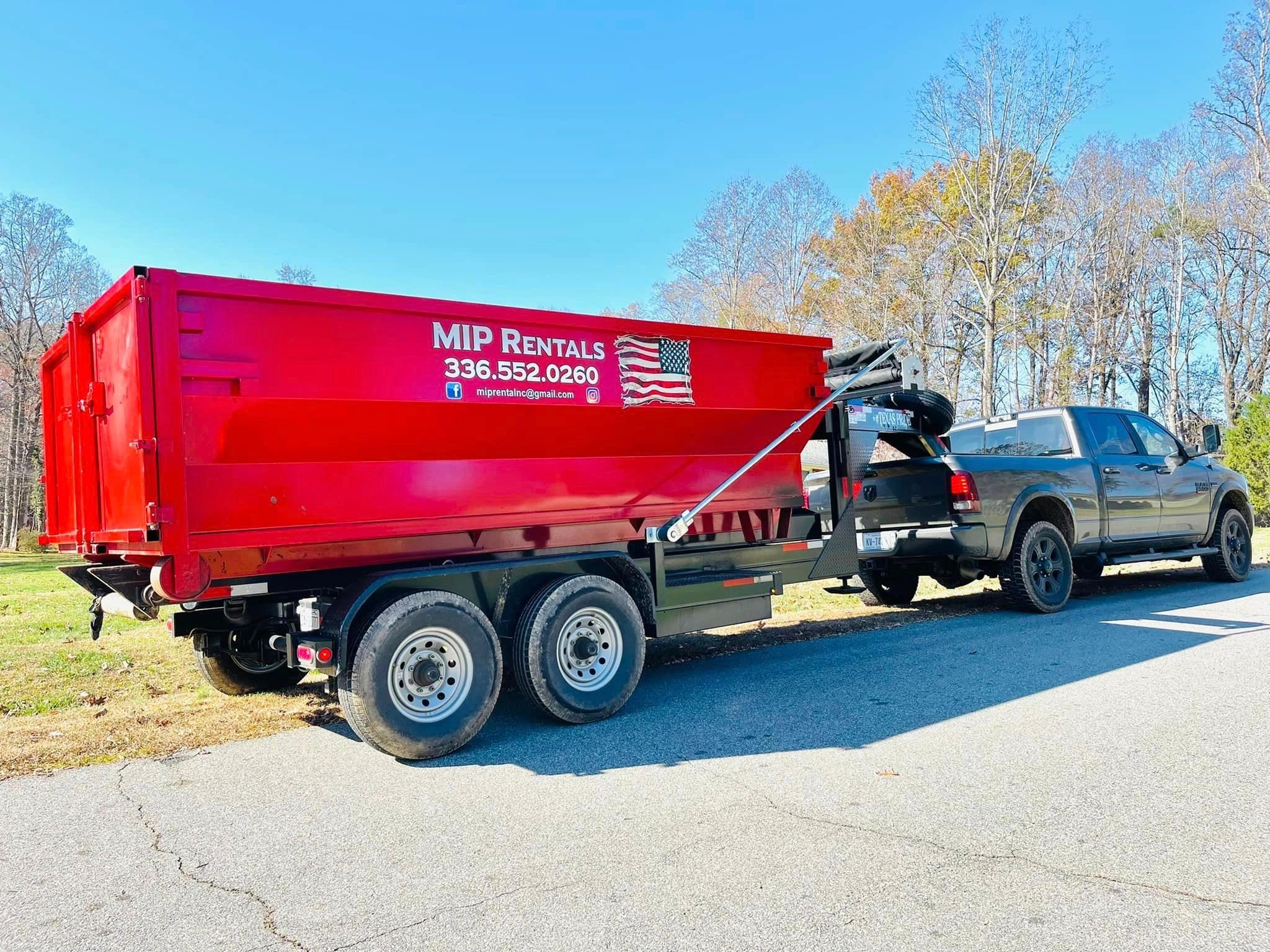Renting a dumpster isn’t something you do every day, but it can make cleanup a lot easier.
With the right size and a little planning, you can save time, avoid extra fees, and get the job done without stress.
This quick guide covers the basics to help you get started.

What is a Dumpster Rental?
A dumpster rental is a simple way to get rid of a lot of trash at once. Instead of piling up junk in your yard or making multiple trips to the dump, you rent a big container, fill it up, and have it hauled away when you’re done. It’s an easy solution for handling waste during projects, big cleanouts, or ongoing business needs.
Why Do People Rent Dumpsters?
People rent dumpsters for all sorts of reasons, but here are the most common:
- Home Cleanouts – Got a garage full of junk? Moving and need to get rid of stuff fast? A dumpster makes it easy to toss everything in one place.
- Construction & Remodeling – Whether you’re knocking down a wall or redoing a kitchen, construction projects create a lot of debris. A dumpster keeps things neat.
- Business Waste – Some businesses produce too much trash for regular pickup. Restaurants, offices, and retail stores often rent dumpsters to keep things tidy.
Short-Term vs. Long-Term Rentals
Not everyone needs a dumpster for the same amount of time. Here’s how rentals usually work:
- Short-Term Rentals – Great for quick cleanouts, small home projects, or weekend renovations. You keep the dumpster for a few days or a week.
- Long-Term Rentals – Best for ongoing construction, business waste, or large projects. You can keep the dumpster for weeks or even months.
Types of Dumpsters and Their Uses
Not all dumpsters are the same. Picking the right one makes cleanup easier and saves you from extra fees. Here’s a quick breakdown.
Residential Dumpsters – For Home Projects
Got junk piling up? These are great for home cleanouts, renovations, and yard waste.
- Sizes: 10-yard, 15-yard, 20-yard (small enough for a driveway)
- Good for: Old furniture, drywall, flooring, branches
- Not for: Paint, tires, hazardous waste
Commercial Dumpsters – For Businesses
If you run a business, you probably need a dumpster for regular trash pickup or big cleanouts.
- Front-load dumpsters – Stay on-site, picked up on a schedule
- Roll-off dumpsters – Temporary, best for large office cleanouts or renovations
Construction & Demolition Dumpsters – For Big Jobs
These are built to handle heavy materials like concrete, bricks, and roofing shingles.
- Best for: Contractors, remodels, demolitions
- Common sizes: 20-yard, 30-yard, 40-yard (big jobs need big dumpsters)
How to Choose the Right Dumpster Size
Picking the right dumpster size can save you money and make cleanup easier. Too small, and you’ll need extra pickups. Too big, and you’re paying for space you don’t need.
Let’s break it down.
Dumpster Size Guide – What Fits Your Project?
Dumpsters come in different sizes, and each one is best for specific jobs. Here’s a quick guide:
- 10-yard dumpster – Great for small cleanouts, yard debris, or minor renovations
- 15-yard dumpster – Works well for medium home projects, like flooring removal or bathroom remodels
- 20-yard dumpster – A good choice for large home cleanouts or small construction jobs
- 30-yard dumpster – Ideal for major renovations, roofing projects, and estate cleanouts
- 40-yard dumpster – Best for large-scale demolitions, commercial projects, or whole-house renovations
Not sure what size dumpster you need? Think about how much waste you’ll have, what kind of debris it is, and how long your project will last.
How Much Does Dumpster Rental Cost?
Dumpster rental prices can vary, and no one likes surprise fees. Knowing what affects the cost can help you budget and avoid extra charges.
Here’s what you need to know.
Pricing Factors – What Affects the Cost?
The price of renting a dumpster depends on a few key things:
- Size of the dumpster – Bigger dumpsters cost more
- Rental duration – Longer rentals may have higher fees
- Location – Prices vary by city and hauling distance
- Type of waste – Heavy materials like concrete or hazardous waste can increase costs
Average Dumpster Rental Costs by Size
Prices can change based on location, but here’s a general idea of what to expect:
- 10-yard dumpster – $250–$400 (small cleanouts)
- 15-yard dumpster – $300–$500 (medium projects)
- 20-yard dumpster – $350–$600 (home renovations)
- 30-yard dumpster – $400–$700 (large cleanouts, construction)
- 40-yard dumpster – $450–$800 (demolitions, big projects)
How Long Can You Keep a Rented Dumpster?
Dumpster rentals aren’t unlimited—you get them for a set time, and keeping one longer can cost extra. Whether you need it for a quick cleanout or a long-term project, here’s what to expect.
Typical Rental Periods
Most dumpster rental companies offer flexible rental times based on your needs:
- Short-term (3–7 days): Great for quick cleanouts or small projects
- Weekly rentals (7–10 days): Best for home renovations or medium-sized jobs
- Long-term rentals (monthly or more): Good for big construction projects or ongoing commercial use
What Can and Can’t Go in a Dumpster?
Not everything can go in a dumpster. Some items are fine, while others are banned for safety and environmental reasons. Here’s what you need to know.
Allowed Items
You can toss in:
- Construction debris – Wood, drywall, bricks, roofing materials.
- Household junk – Furniture, clothes, boxes, and general trash.
- Yard waste – Leaves, branches, grass clippings, small stumps.
Prohibited Items
These can’t go in a dumpster:
- Hazardous waste – Paint, motor oil, pesticides, batteries.
- Electronics – TVs, computers, appliances.
- Tires – Most landfills reject them.
- Chemicals – Gasoline, propane tanks, cleaning supplies.
What to Do with Restricted Waste
- Recycle centers take electronics, metal, and some construction debris.
- Hazardous waste facilities accept paint, chemicals, and batteries.
- Tire shops often accept old tires.
- Local disposal events may take restricted waste for free.
Do You Need a Permit for a Dumpster Rental?
It depends! If the dumpster is going in your driveway or on private property, you probably don’t need one. But if it’s on the street, sidewalk, or any public space, a permit is usually required.
How to Get a Dumpster Permit
Check with your city or county office. Some let you apply online, while others require a visit. Your dumpster rental company might also know the local rules.
What Does a Permit Cost?
Fees vary—some cities charge $10-$25, while others can be over $100. The cost often depends on how long the dumpster will be there.
Skipping a permit when it’s required could mean fines or removal, so it’s always best to check first!
How to Find a Reliable Dumpster Rental Company Near You
Not all dumpster companies are the same. Some charge hidden fees or have poor service, so it helps to do a quick check before you book.
Look for:
- Clear pricing with no surprise charges
- Good customer reviews
- Help with permits if needed
Ask about pickup and drop-off, extra fees, and what sizes they offer.
Local companies are often easier to work with and know the area better than big chains.
Ready to Rent a Dumpster? Here’s What to Do Next
Dumpster rental in Stokesdale, NC, makes cleanouts, home projects, and renovations much easier when it’s done right. Choosing the right size, knowing what you can load, and planning ahead can save you time and money. A little prep goes a long way, especially when you’re working on a tight schedule or space.
For a smooth, no-stress rental, go with a local team you can count on—MIP Rentals. We keep things simple with clear pricing, on-time service, and no hidden fees. Email us at miprentalnc@gmail.com or Contact us to get started.


